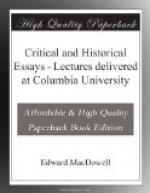Referring to some newspaper reports which he knew to be without foundation, Bismarck once said, “Newspapers are simply a union of printer’s ink and paper.” Omitting the implied slur we might say the same of printed music and printed criticism; therefore, in considering printed music we must, first of all, remember that it is the letter of the law which kills. We must look deeper, and be able to translate sounds back into the emotions which caused them. There is no right or wrong way to give utterance to music. There is but one way, namely, through the living, vital expression of the content of the music; all else is not music but mere pleasure for the ear, a thing of the senses. For the time being we must see through the composer’s eyes and hear through his ears. In other words, we must think in his language. The process of creating music is often, to a great extent, beyond the control of the composer, just as is the case with the novelist and his characters. The language through which musical thought is expressed, however, is a different thing, and it is this process of developing musical speech until it has become capable of saying for us that which, in our spoken language, must ever remain unsaid, that I shall try to make clear in our consideration of form in music.
Until the very end of the fifteenth century, music, so far as we know, had no language of its own, that is to say, it was not recognized as a medium for expressing thought or emotion. Josquin des Pres (born at Conde in the north of France in 1450, died 1521) was the first to attempt the expression of thought in sound. Luther, in rebelling against Rome, also overturned the music of the church in Germany. He incorporated many folk songs into the music of the Protestant church and discarded the old Gregorian chant (which was vague in rhythm, or, rather, wholly without rhythm), calling it asinine braying.
While Luther was paving the way for Bach by encouraging church music to be something more than merely the singing of certain melodies according to prescribed rules, in Italy (at the time of his death in 1546) the Council of Trent was already trying to decide upon a style of music proper for the church. The matter was definitely settled in 1562 or 1563 by the adoption of Palestrina’s style.[13] Thus, while in Germany ecclesiastical music was being broadened and an opening offered for the development of the dramatic and emotional side of music, in Italy, on the contrary, the emotional style of music was being neglected and an absolutely serene style of what may be called “impersonal” music encouraged. Italy, however, soon had opera on which to fall back, and thus music in both countries developed rapidly, although on different lines.
In England, the budding school of English art, as exemplified by Purcell, was soon overwhelmed by the influence of Haendel and the all-pervading school of Italian opera, which he brought with him.




